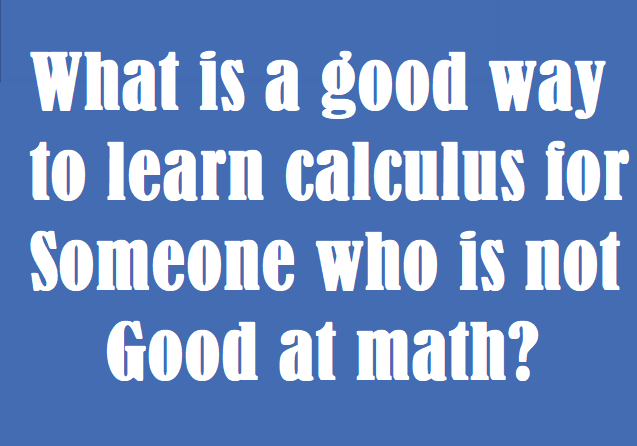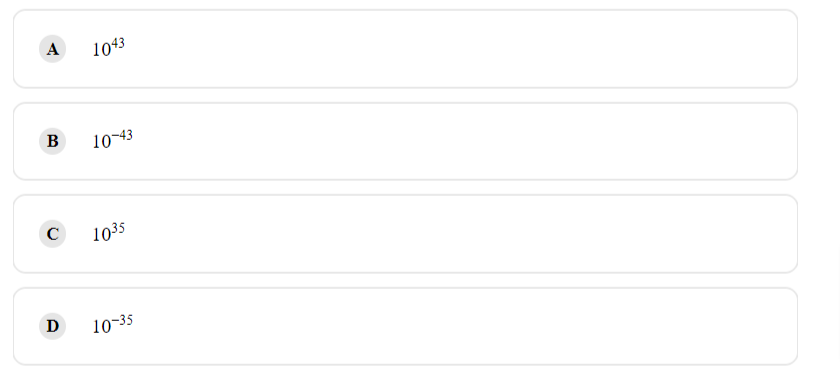What is a good way to learn calculus for someone who is not good at math?
What is a good way to learn calculus for someone who is not good at math?
What is a good way to learn calculus for someone who is not good at math? I would say the challenge with most math and science in general is that people don't really know how well they understand something until they encounter a barrier. So I recommend a few things.
Redo the examples from class when you get home and see if you can solve them without the notes from class.
What is a good way to learn calculus for someone who is not good at math?
Try to explain what you learned to someone else both through concepts and examples. Have them ask you questions about it and try to answer them.
Look for things you don't know about the topic. Find the challenges. There will always be new ones. Many students focus upon the things they already understand when they should be studying the things they find difficult.
What is a great motivation to learn calculus?
Calculus is practically your first exposure to the properties and uses of infinity. The most important concept is the concept of a limit. What does it mean for a function to approach an asymptote? How can we say it's approaching a particular value as it goes to infinity if it never reaches that value? What does continuity mean, and how can you tell if something really is continuous? Calculus can answer these questions.
You also get into derivatives and learn about instantaneous rate of change. What does it mean to talk about the speed of something at an exact moment of time? Speed is moving from one position to the next as you go from one moment to the next, so how can you talk about speed at a single moment in time?
Then you get into integrals and learn the fundamental theorem of calculus, which is beautiful in itself. You get to talk about infinite sums. How does it make sense to add up infinitely many numbers? Even more so, how can you add up infinitely many things that are each infinitely small?
Learning these things opens your mind up to whole new possibilities about infinity, and it gives you the language to understand a whole new set of even more complicated questions about infinity. The way you think about speed and curves in the real world will be fundamentally changed.
Learning algebra is like learning how to read the language of mathematics, but learning calculus is like finally reading your first masterpiece of literature. You finally get to use the language to accomplish profound results which form the foundation for every piece of our modern world. As you do so you'll be faced with more complex and challenging logical arguments than you have seen before, and it will require you to hone your logical abilities. Your problem solving abilities in general will be refined as a result.
What can I do to be good at calculus?
This is based on some advisory notes from my former colleague Bret Benesh.
Plan to work at it regularly. Ideas in math build on each other so if you fall behind the problems compound.
Concentrate actively. Absorbing what happens in class is not enough. Read the book in advance of class, with a pencil to verify steps and record questions. Mathematical writing cannot be skimmed like a novel or essay. Every word is precise and important.
Ask questions. You will always have the book or online resources but your time with the instructor is limited. Use class, study sessions, office hours, etc., wisely. Do not be embarrassed to admit you do not know something or understand something.
Explain your answers. To yourself, to your classmates, to your teachers. A student who can write out their answer in careful notation and English sentences understands more than one that flails around with algebra until they reach a number, then circles it. At this level there are fewer template problems where you can find a similar problem worked out in the book. You need to put together concepts.
Learn from your mistakes, and your successes. Each problem and homework assignment is a chance to measure your understanding, but you won't learn much if all you take away is that you got it wrong. Understand why you got it wrong and how you could have avoided the mistake. If you got it right, think about how the problem would change if you changed the statement slightly. Think about how you knew you had the right answer. Think about how you would recognize problems like this in the future.
Persevere. Math is like swimming. Some people have a natural affinity and talent for it. But everybody can be competent at it, and everybody should be better at it. The only way to get better is not to watch somebody do it, but to do it oneself.
I was never that great at math. Perhaps in elementary school I'd get receive the odd 'A' here and there, but I was mostly in the 'C'-area if anything. Moving on to high school, things didn't get any better.
My marks for grade 9, 10, and 11 were 51, 40, and 56 respectively. (The 40 meant I failed and needed to attend summer school where I got a 60-something and was able to move on). My 10th grade teacher told me that math was an "either you get it or you don't" subject. My 11th grade teacher told me he had tried everything, and when I pleaded with him that I still didn't understand anything, he repeated himself more firmly, "I have tried everything I can to help you", and walked away.
That summer, upset and determined, I decided that if I ever expected to make any serious changes in my marks, I needed to take serious action. Until then I tried getting occasional tutoring on the side - wasting my parents' money on tutors that didn't make much of a difference.
I decided to change things up. I found a tutor hall downtown (I live in a major city) and went down with my father to have a look. It's simply an area where students go to study and the place is monitored by teachers/tutors. You pay a small fee and sit there and study, and if you need help you can ask one of the tutors to come by and help out briefly.
I started at the beginning of August that summer, took out textbooks from the 9th grade onwards, and worked my way up. I studied non-stop, 8-10 hours a day, 6 days a week (I would take one day off for our family to go out together), for 6 weeks (until school started in mid-September.) This is what they call complete and total immersion. Through these 6 weeks, I was able to completely and fully understand grade 9, 10 and 11 math. I was also able to teach myself (with some assistance of course) calculus, algebra geometry and advanced functions.
Where It Took Me In School
Now, what came of all this? Well here you go.
Grade 12 Advanced Functions 90%
Grade 12 Calculus & Vectors 93%
In my country (Canada), we also have a national competition conducted by the University of Waterloo called the Euclid Mathematics Competition. I decided to partake in it for fun. Turns out, I scored the highest in my school and was one of the top students in the region - hello cool looking medal and certificate! I couldn't believe that I had beat out the students in my school who had received 90s all throughout their high school journeys.
I later got admitted into a top University, took courses in math and astrophysics and found them to be relatively easy (but challenging enough for me to enjoy them).
Where It Took Me In Everyday Life
- What those 6 weeks gave me was priceless. I noticed in the everyday that my ability to analyze and rationalize greatly deepened.
- I was able to calculate numbers and solve math problems in my head at astounding speeds.
- I noticed I was calmer, cooler in my attitude and very composed - a result most likely of my ability to analyze emotional events and respond rationally and appropriately.
- My ability to consume and retain information improved, my memory capacity increased, and I was simply "smarter" as a person.
- To conclude, I will say that I used to question whether math was useless all the time. When my teacher would talk about finding the slope of a line, I'd wonder to myself "when will I ever use this?" But to paraphrase something a famous teacher said once, how would doing the bench press help you in real life? When would you ever come across a time in the real world when someone meets you in the street, pushes you down and throws a big weighted-bar on you? That's not why you do the bench press.
- You do it to strengthen your chest muscles, to make them bigger and stronger. In turn, you also indirectly hit your shoulders and triceps.
- What good is doing repetitive motions daily on your muscle groups? For overall body health, to help you sleep better, feel better, to reduce depression, and to ensure you'll be in shape for anytime life throws ANY form of physical activity your way.
- By working your muscles out in the gym, you'll vastly improve your capability in sports, sex and other areas of life.
- So what is math? Of course there might be few times in life where someone will ask you to find the slope of the tangent of a specific formula.
- But what you gain from learning these concepts is greater. You gain improved focus, concentration, brain and mental health, and intelligence.
- You increase your confidence, ability to analyze and rationalize, ability to understand complicated problems and break things down into smaller components.
- You're able to increase your capacity for learning and gaining new skills faster. You improve memory. Math, in other words, is exercise for the brain.
In Summary, practice practice practice.
Related Posts:










Leave a Comment